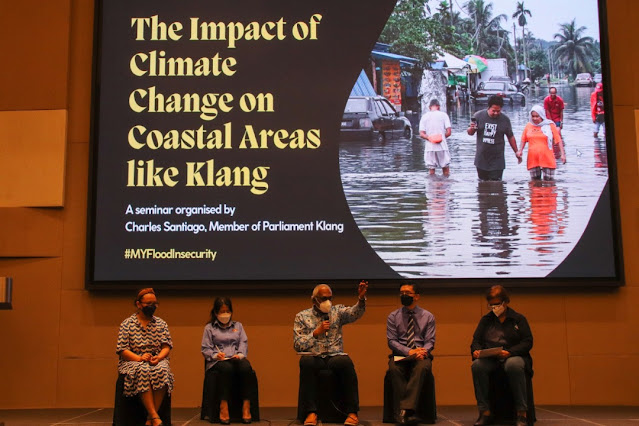Klang residents: We want to take govt to court
Klang residents want to explore the possibility of a law suit against the Malaysian government for dereliction of duty during the December floods.
This is one of the calls at the seminar 'The Impact of Climate Change on Coastal Areas Like Klang' held at Wyndham Acmar Klang hotel yesterday.
Klang MP Charles Santiago said Selangor has a responsibility to protect and promote the rights and interests of its citizens.
"However, during the floods, there was hardly an early warning system or efficient flood relief efforts to help vulnerable individuals and communities," said Santiago.
"In fact, government officials were missing in the first three to four days, and people took it upon themselves to organise food distributions and rescue missions."
The participants, during floor discussions, also raised the possibility of the formulation of a new drainage and irrigation system for Klang.
This would involve interphasing the movement of water through rivers.
"Thus, these rivers need to be widened and deepened to allow a greater flow of water," said Santiago.
"In this way, planners avoid developing drainage specific to a local residential area but allow the movement of water between a number of areas before it clears into a river."
This suggestion takes into consideration that Klang has become a densely-populated area requiring a different approach to managing floods and the fact that the current drainage system is unable to accommodate high rainfall and sea level rise.
Another takeaway from the seminar organised by Santiago's office is for the National Disaster Management Council, the government-mandated national relief agency, to be shut down and replaced by a Disaster Relief Force with a national legislative framework in flood management.
This, however, would entail a comprehensive piece of legislation to unify the various laws and regulations, including policies and programmes to reduce flood-related risks.
Currently, the country's flood relief and recovery efforts are organised under National Security Council Directive No. 20, where about eight laws and regulations are invoked when responding to a disaster.
"This approach needs to be changed," said Santiago.
"Countries with integrated legislations to reduce disaster risks have had major success in the overall management of floods and disasters.
"The government needs to consider setting up a Disaster Relief Force, constituting members of the police, army and air force that can be deployed when confronted with a disaster."
He said the cost of setting up this outfit would not be astronomical as they would come from the existing security and defence forces.
An effort such as this would help facilitate the deployment of servicemen on short notice and mobilise equipment for purposes of relief.
"One example would be India’s National Disaster Response Force that brings together various forces from different bodies.
"Drastic situations require drastic measures. Malaysia is experiencing frequency of extreme weather conditions with places that have never experienced floods facing high rain falls and flooding," he said.
Some areas in Klang have experienced several flooding episodes over the last six months. And there are more landslides in different parts of the country as well.
"Instead of seriously looking at mitigation factors, the government is playing down the urgency on the ground," Santiago said.
"But it must stop manufacturing flood insecurity and act immediately before another flood disaster strikes," he added.

.jpeg)


Comments
Post a Comment